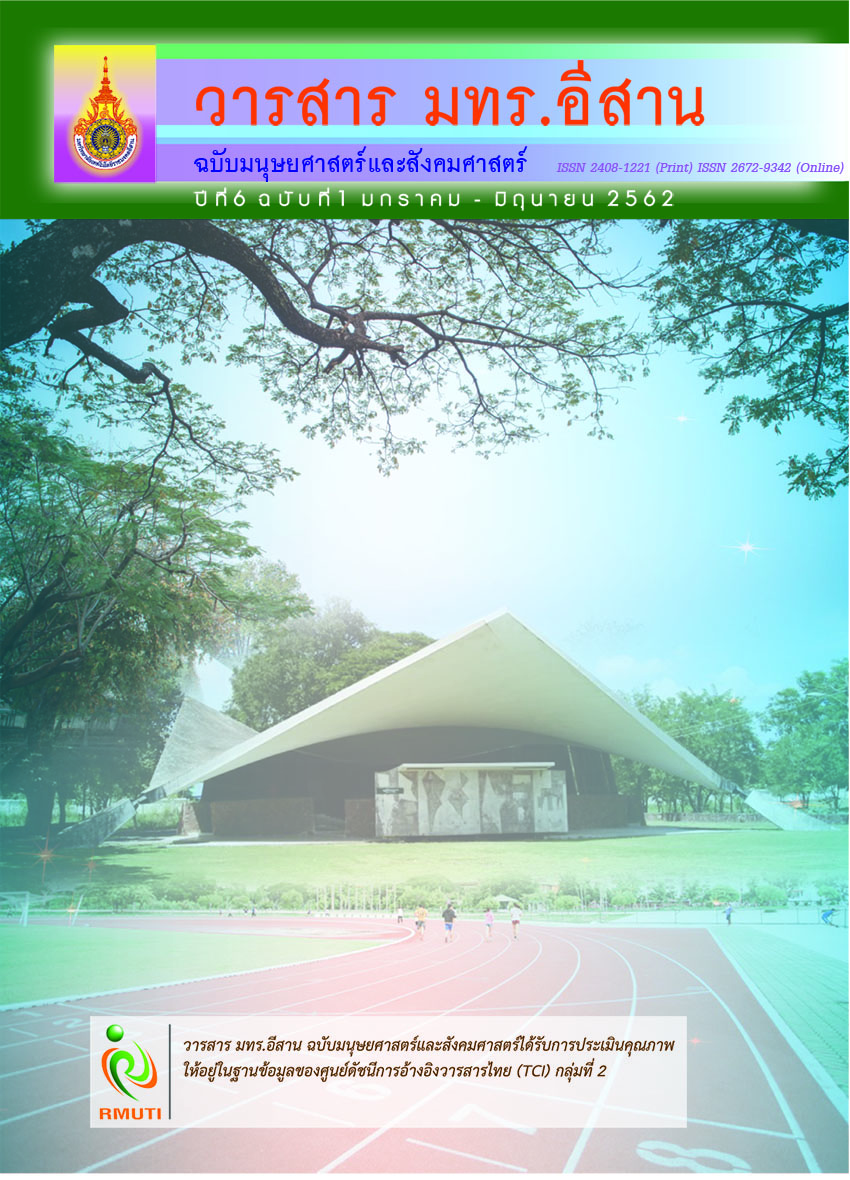The Using of Inquiry and Creativity-Based Learning to Effectiveness Digital Literacy of Mainstreaming Students, Library and Information Science Program
Main Article Content
Abstract
The objectives of this research were 1) to create the inquiry and creativity-based learning plan, and 2) to using of inquiry and creativity-based learning to effectiveness digital literacy of mainstreaming students, Library and Information Science Program. The sample used for the experimental group consisted of 35 undergraduate students in the Knowledge and Local Wisdom Management course in the 2018 academic year, section A1 of Library and Information Science Program. There were regular 26 students and 9 special need students. The research instruments were the inquiry and creativity-based learning instructional plan and the digital literacy capability measurement. The data obtained were analyzed using mean and standard deviation. The results of the study were as follows: the digital cognition of the sample was 13.43. The scores of special need students were 11 - 15 with a score above average with 6 persons from 9 persons, there was 66.66 percentage. The scores of regular students were 9 - 17 with a score above average with 13 persons from 26 persons, there was 50.00 percentage. The overview of digital literacy practice was the highest level. The digital information literacy was the highest level, digital technology using, and digital media literacy were high level.
Article Details
บทความที่ได้รับการตีพิมพ์เป็นลิขสิทธิ์ของมหาวิทยาลัยเทคโนโลยีราชมงคลอีสาน
ข้อความที่ปรากฏในบทความแต่ละเรื่องในวารสารวิชาการเล่มนี้เป็นความคิดเห็นส่วนตัวของผู้เขียนแต่ละท่านไม่เกี่ยวข้องกับมหาวิทยาลัยเทคโนโลยีราชมงคลอีสานและคณาจารย์ท่านอื่นๆในมหาวิทยาลัยฯ แต่อย่างใด ความรับผิดชอบองค์ประกอบทั้งหมดของบทความแต่ละเรื่องเป็นของผู้เขียนแต่ละท่าน หากมีความผิดพลาดใดๆ ผู้เขียนแต่ละท่านจะรับผิดชอบบทความของตนเองแต่ผู้เดียว
References
ธิดา แซ่ชั้น และทัศนีย์ หมดสอน. (2559). การรู้ดิจิทัล: นิยาม องค์ประกอบ และสถานการณ์ในปัจจุบัน. วารสารสารสนเทศศาสตร์. ปีที่ 34. ฉบับที่ 4. หน้า 116-145
บุญชม ศรีสะอาด. (2556). การวิจัยเบื้องต้น. พิมพ์ครั้งที่ 9. กรุงเทพ: สุวีริยาสาส์น
ไพฑูรย์ สินลารัตน์ สินธะวา คามดิษฐ์ เฉลิมชัย มนูเสวต วาสนา วิสฤตาภา และนักรบ หมี้แสน. (2559). การศึกษา 4.0 เป็นยิ่งกว่าการศึกษา. วิทยาลัยครุศาสตร์ มหาวิทยาลัยธุรกิจบัณฑิตย์
วิริยะ ฤาชัยพาณิชย์ และกมลรัตน์ ฉิมพาลี. (2559). ห้องเรียนแห่งอนาคต เปลี่ยนครูให้เป็นโค้ช. กรุงเทพฯ: ซีเอ็ดยูเคชั่น
สถิตย์โชค โพธิ์สอาด. (2559). Grand challenges in digital university. วารสารเทคโนโลยีสุรนารี. ปีที่ 10, ฉบับที่ 2, หน้า 171-188
สุระสิทธิ์ ทรงม้า ภูริพจน์ แก้วย่อง วัชรากรณ์ เนตรหาญ และจุฑาวุฒิ จันทรมาลี. (2560). พฤติกรรมการใช้อินเทอร์เน็ตที่เสี่ยงต่อการกระทำความผิดเกี่ยวกับพระราชบัญญัติว่าด้วยการกระทำความผิดเกี่ยวกับคอมพิวเตอร์ พ.ศ. 2560. วารสารสถาบันวิจัยและพัฒนา มหาวิทยาลัยราชภัฏบ้านสมเด็จเจ้าพระยา. ปีที่ 2. ฉบับพิเศษ. หน้า 1-10
สำนักงานเลขาธิการสภาการศึกษา. (2560). แผนการศึกษาแห่งชาติ พ.ศ. 2560 - 2579. สำนักงานเลขาธิการสภาการศึกษา กระทรวงศึกษาธิการ
สำนักงานส่งเสริมและพัฒนาคุณภาพชีวิตคนพิการแห่งชาติ. (2561). พระราชบัญญัติการจัดการศึกษาสำหรับคนพิการ พ.ศ. 2551. เข้าถึงเมื่อ (13 มกราคม 2561). เข้าถึงได้จาก (http://dep.go.th)
สำนักบริหารงานการศึกษาพิเศษ. (2558). รายงานผลการประชุมวิชาการนานาชาติด้านการศึกษาพิเศษ ครั้งที่ 1. สำนักบริการงานการศึกษาพิเศษ สำนักงานคณะกรรมการการศึกษาขั้นพื้นฐาน กระทรวงศึกษาธิการ
อรวรรณ นิ่มตลุง. (2552). การศึกษาแบบเรียนรวม: หนทางนำไปสู่การศึกษาเพื่อปวงชน. วารสารมหาวิทยาลัยราชภัฏสกลนคร. ปีที่ 1, ฉบับที่ 2, หน้า 39-53
Eshet-Alkalai, Y. (2004). Digital Literacy: A Conceptual Framework for Survival Skills in the Digital Era. Journal of Educational Multimedia and Hypermedia. Vol. 13, No. 1, pp. 93-106
International Federation of Library Associations and Institutions. (2015). IFLA School Library Guidelines. Access (15 January 2017). Available (https://creativecommons.org/licenses/by/3.0)
JISC. (2010). Quick guide-Developing students’ digital literacy. Access (19 May 2018). Available (https://digitalcapability.jiscinvolve.org/wp/fi les/2014/09/JISC_ REPORT_ Digital_ Literacies_280714_PRINT.pdf)
Martin, A. and Grudziecki, J. (2006). DigEuLit: Concepts and Tools for Digital Literacy Development. Innovations in Teaching and Learning in Information and Computer Sciences. Vol. 5, Issue 4, pp. 249-267. DOI: 10.11120/ital.2006.05040249
Netwong, T. (2018A). Promotion Reading Project Based Learning to Enhance Reading Habit and Learning Culture for Inclusion. International Journal of Social Science and Humanity. Vol. 8, Number 1, pp. 14-19. DOI: 10.18178/ijssh.2018.V8.926
Netwong, T. (2018B). Instructional Creation Media Project Based for Mainstreaming of Undergraduate Students to Enhance 21st Century Learning. International Journal of e-Education, e-Business, e-Management and e-Learning. Vol. 8, No. 4, pp. 227-233. DOI: 10.17706/ijeeee.2018.8.4.227-233
Ontario School Library Association. (2010). Together for Learning: School Libraries and the Emergence of the Learning Commons. Ontario School Library Association, Ontario’s Ministry of Education
Parameswari, M. and Priya, S. (2016). Survival Skills in Digital Era. An International Journal of Interdisciplinary Studies. Vol. Special Issue, No. 1, pp. 1-5
Trilling, B. and Fadel, C. (2009). 21st century skills: learning for life in our times. San Francisco: Jossey-Bass


